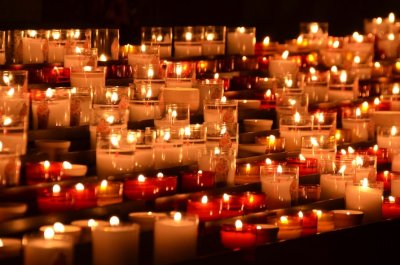The Grieving Process When we Miss the Funeral – Mourning from Afar or Alone

photo by Irina Anastasiu for Pexels
Andrea M. Darcy
Stuck far away or overseas during the loss of a loved one or friend? The grieving process is unique when we can’t be part of group bereavement, even if you expected the loss. What can help?
Guilt that we can’t be with our loved ones as they go
Guilt can be immense if a loved one or friend died far away or even alone. Our minds might again and again imagine the very worst of what this was like for them.
Why do we feel guilty for something we had no control over? It can be a coping mechanism.
Speaking to Rolling Stone magazine, well-known grief expert David Kessler explained, “We are uncomfortable in a world where we’re helpless. We need to find control. So our control is ‘Well, I’m just going to be guilty about it — that’s what I’m doing.’”
What all experience the grieving process differently
In the book “Men Don’t Cry, Women Do”, researchers Martin and Doka found that some of us have an ‘intuitive’ grieving style, where we process with emotions, and others have a physical and cognitive style, where grief is processed more with thinking and body symptoms.[1]
So we can’t necessarily ever know if our grieving process would have been different if we were there for the end of a loved one’s life or the funeral, as grief is unpredictable.
What might happen if we are grieving at a distance
But what might be more likely to happen if we are left to mourn from a distance? What can we perhaps expect or be on the lookout for?
1. A longer grief period.
Not being able to be with your loved one as they pass, and not being able to access the mourning rituals of your culture? Might mean that the grief process stretches on even longer.

photo by Yuris Alhumaydy
But this is not for certain. Some of us are far more resilient in the face of grief than we expect.
A research study on bereavement patterns led by psychologist and grief expert George Bonnano looked at 205 individuals several years prior to the loss of their spouse, then at six and 18 months post bereavement. A pattern of resilience proved more frequent than both common grief and chronic depression. [2]
2. Anger at yourself and the situation.
Anger is a common stage of grief, and in this case might be directed towards the situation that meant you weren’t able to attend the group mourning or funeral. This could look like being angry at your employer who wouldn’t give you time off, a family member who wouldn’t take care of the kids and let you go, or even at yourself for not being there. Try to recognise that it’s just grief talking over pick fights that leave you feeling worse.
3. Increased feelings of helplessness.
Feelings of helplessness are a part of grieving for many. But now we also might feel helpless against the situation that kept us apart from being with loved ones and the mourning experience.
4. More loneliness.
The feeling of loneliness might be greater, particularly if it seems everyone else was there but you.
5. A delayed grieving process.
The strange, disconnected loss of losing a loved one when we are far from the experience might mean we put off mourning until we meet someone who was there. Or make a trip to, say, see the grave if there is one.
The changing ritual of the grieving process
There are new ways of mourning that can feel helpful for some of us, such as attending a video streaming of the funeral or memorial, or posting on the Facebook page of the deceased.
For young people, this way of grieving could actually feel more comfortable. In a study on students after a series of shootings in schools in Illinois, USA, students perceived their Internet activities around grieving, such as on Facebook, as being beneficial to them. [3]
But a recent study on Facebook memorials found there could be two sides to consider. Yes, online memorials have the positive affect of allowing or even creating friendships among the friends of the deceased. But they can mean you don’t have the same control over your memories of your loved one, having to face other people’s perspectives and framings. This can possibly create grief instead of alleviate it. [4]
So in the face of these new ways of mourning, listen to your own instincts. If it makes you feel uncomfortable, it might be best to avoid altogether and mourn in the way that feels right to you.
7 Ways to navigate grief from afar
So what can help if you are experiencing the grieving process alone and from afar?
1.Don’t judge yourself for not mourning like the others.
The five stages of grief are popular, but were never destined by their creator to be an exact map. The truth is that people mourn differently. and that’s fine.
2. Honour your feelings as they are.
It’s okay and normal when in the grieving process to feel all sorts of emotions. And don’t assume they will all be negative. Sometimes you might feel really low one day then insanely happy for no reason the next. That’s okay too. You are allowed to feel good.
3. Investigate mortality and fear of dying.

photo by Matthias Zomer for Pexels
Losing a loved one can trigger our own fear of death and dying. If this is you, consider joining an online ‘death cafe’ where you can talk about and learn about death with supportive others.
4. Use tools that work for you.
If you hate sharing your feelings, try journalling. Other people like to express their grief through dance, or art. Or use therapy tools like the Gestalt chair method.
5. Don’t disappear.
Do you withdraw when stressed? Fair enough. But do try to keep at least some connection with others as it connection is shown to help lessen depression.
6. Use gratitude and positive thinking carefully.
Of course it matters to be grateful for the relationship we had with our loved one and the time we did spend together.
But be wary of using gratitude and ‘positive thinking‘ to repress feelings. Grief doesn’t go away if we ignore it, it just gets delayed or comes out in other, sometimes more destructive ways down the line.
7. When in doubt, reach out.
If you find it hard to express your emotions with friends and family, or don’t have anyone to talk to? Consider grief counselling over the internet. It can be a huge relief to talk to someone who understands.
We connect you with top London bereavement therapists now working over the internet. Or use our booking platform to find UK-wide Skype grief counsellors.
Still have a question about the grieving process during Covid19? Or want to share your experience with other readers? Post below.
 Andrea M. Darcy is the editor and lead writer of this site. A writer for over twenty years, she also studied counselling and coaching.
Andrea M. Darcy is the editor and lead writer of this site. A writer for over twenty years, she also studied counselling and coaching.
FOOTNOTES
[1]Martin, T. L., & Doka, K. J. (2000). Series in death, dying, and bereavement. Men don’t cry…women do: Transcending gender stereotypes of grief. Brunner/Mazel.
[2]Bonanno, G. A., Wortman, C. B., Lehman, D. R., Tweed, R. G., Haring, M., Sonnega, J., Carr, D., & Nesse, R. M. (2002). Resilience to loss and chronic grief: A prospective study from preloss to 18-months post loss. Journal of Personality and Social Psychology, 83(5), 1150–1164.
[3] Vicary, Amanda & Fraley, R.. (2010). Student Reactions to the Shootings at Virginia Tech and Northern Illinois University: Does Sharing Grief and Support Over the Internet Affect Recovery?. Personality & social psychology bulletin. 36. 1555-63. 10.1177/0146167210384880.
(2015) ‘We do it to keep him alive’: bereaved individuals’ experiences of online suicide memorials and continuing bonds, Mortality, 20:4, 375-389, DOI: 10.1080/13576275.2015.1083693.




